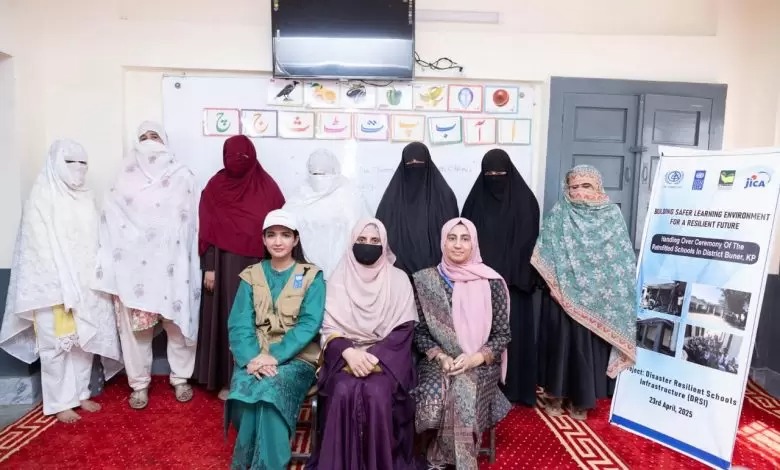
In a significant step towards providing a safe educational environment for children in Pakistan's climate-vulnerable regions, 24 renovated schools in Buner district of Khyber Pakhtunkhwa were handed over to the local community during a special ceremony.
This initiative is part of the Disaster-Resilient School Infrastructure (DRSI) project, a collaborative effort supported by the Japan International Cooperation Agency (JICA) and jointly implemented by UN-Habitat and UNDP in partnership with the Khyber Pakhtunkhwa Department of Elementary and Secondary Education.
The project aims to enhance the resilience of 150 schools across various districts, including Buner, Malakand, Peshawar, Swat, Lower Chitral, Upper Chitral, Lower Dir, and Upper Dir. These schools are being upgraded to meet modern safety standards, ensuring they are resilient to natural disasters. The initiative directly benefits 31,218 students, including 13,595 girls, and aligns with the Sendai Framework’s goals of making schools safer in disaster-prone areas, particularly those affected by earthquakes and floods.
As of now, 24 schools in Buner have been fully renovated and handed over to the community, with work ongoing on one additional school. The project also includes the construction of 50 new toilets to improve sanitation facilities for students and staff, ensuring a healthier environment for learning.
Key Stakeholder Statements:
JICA's Chief Representative, Mr. Naoki Miyata, emphasized the importance of the initiative, stating that it would help strengthen educational infrastructure against natural disasters. He noted that this project not only enhances the safety of educational institutions but also improves vital services like water, sanitation, and hygiene (WASH), which are critical to reducing the impacts of natural disasters and promoting sustainability in the region.
Speaking at the event, Mr. Javed Ali Khan, Senior Advisor and Program Manager at UN-Habitat, outlined the objectives of the project, explaining how UN-Habitat is promoting sustainable infrastructure in the education sector through both structural and non-structural measures. He added that with the completion of the school repairs, students in Buner can now receive an education in a safe, disaster-resilient environment.
Hamid Mumtaz, Deputy Program Manager at UN-Habitat, highlighted the earthquake risks and structural vulnerabilities of schools in the region. He explained that UN-Habitat had led the design and implementation of the project, incorporating structural assessments, cost estimation, site planning, supervision, capacity building, and stakeholder coordination. In addition to strengthening the schools, various improvements were made, including repairs to stone walls, waterproofing of roofs, installation of new windows for better light and ventilation, enhanced flooring, and the provision of fans, lights, sanitation facilities, and teaching boards.
Mr. Abdul Haseeb, Head of the UNDP Khyber Pakhtunkhwa Sub-Office, reiterated UNDP's ongoing commitment to sustainability in the education sector. He explained how effective contract management, financial oversight, and comprehensive monitoring had not only improved educational infrastructure but also contributed to enhancing health and the overall educational environment. This milestone reflects UNDP's vision that making education disaster-resilient is not just a protective measure, but also an investment in the future.
The event was attended by representatives from the Khyber Pakhtunkhwa Department of Education, UN-Habitat, UNDP, local leaders, teachers, parents, and students. The District Education Officer of Buner expressed his gratitude to JICA, emphasizing that the construction of earthquake-resistant schools not only saves lives but also ensures the continuity of education for children, even in the face of natural disasters.